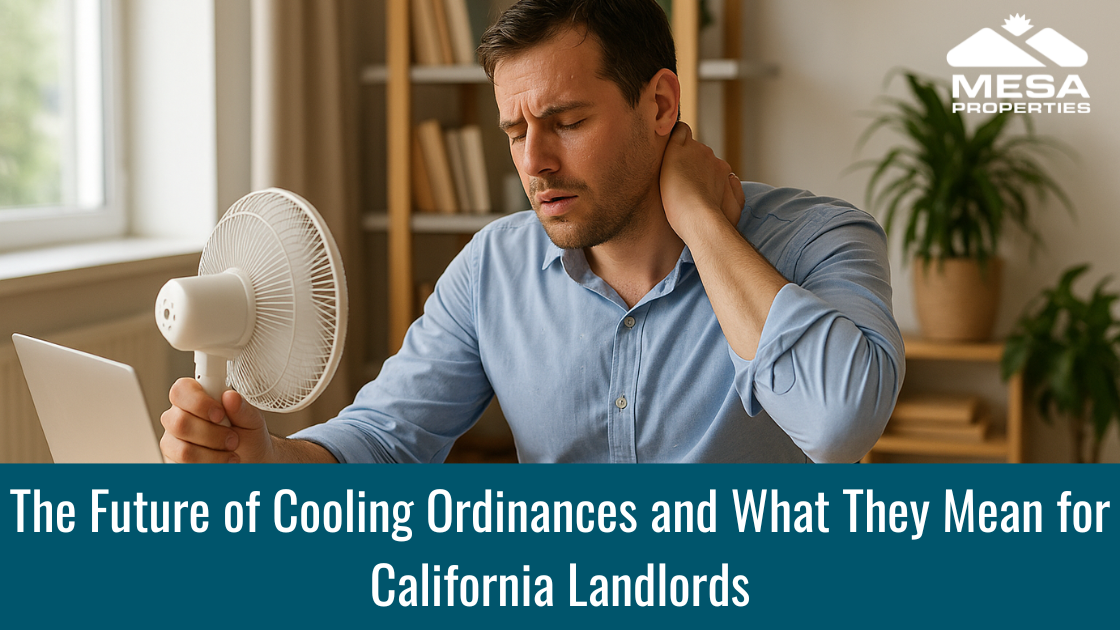Next week, the LA County Board of Supervisors will consider a mandatory cooling ordinance for the city of LA as well as unincorporated portions of the county. This ordinance would mandate that a residential dwelling unit must have a maximum temperature threshold of 82 degrees.
What this means is that it becomes the landlord’s responsibility to ensure the rental unit can be maintained 82 degrees or below during any type of weather and in every habitable room of the house at all times. If this can’t be achieved, the home would be considered uninhabitable and all of the legal implications that come with that would apply.
You can view the ordinance here. It’s clearly assumed to pass because the County has already set up a website with instructions for Landlords that speaks of the ordinance as if it has already passed. The page linked states: “The ordinance goes into effect on September 4, 2025” which is interesting language considering it won’t even be considered until August 5, 2025.
You may not own rental property in the City of Los Angeles or unincorporated Los Angeles County, but if you are a landlord anywhere in California, you should still be concerned. Ordinances like this that start at the city level often set the precedent for the State to make a similar law. Just look at AB 1482 which is California’s state-wide rent control. Cities like Los Angeles and San Francisco had rent control in effect long before the State stepped in with their own. It is often only a matter of time before the State takes its cues from its more progressive cities and implements state-wide laws that have the same effect.
Why Does It Matter?
82 degrees seems pretty warm for an internal temperature, so what’s the big deal here? At least, this is the argument that tenant advocates are making regarding this ordinance and others that are similar to it.
The problem is, ordinances like this don’t take into account several important factors:
- What if the home is old and wasn’t built to accommodate an air conditioner? Is the landlord required to install one at any cost?
- How long does the AC have to run before it gets the temperature down to 82 degrees?
- What if multiple rooms in the house can stay below 82 degrees but one bedroom that is west-facing stays just above it for a few hours a day in the late afternoon?
- What if the landlord is paying utilities and currently keeping the rent low to compensate for lack of AC? If they are then forced to install AC and take on the additional electrical costs, they may also be unable to raise the rent appropriately due to rent control.
This ordinance, assuming it passes, will create tons of conflict between tenants and owners. There is so much that is left undefined by the ordinance that it will be up to attorneys and judges to interpret what the implications are, but this will almost certainly be unfavorable for landlords in a multitude of ways.
The truth is, most homes have AC these days, but there are still several that do not. The ones that do not demand much lower rent than the ones that do to compensate. This is the free market at work. If you want AC, you pay more for it in rent. If you are ok living without it, you are going to get a serious discount as a result.
However, when the government steps in and mandates something like this, the free market economics are disrupted and there are serious negative effects. Landlords without AC and low rent now get a huge bill to install AC and no ability to raise the rent to compensate for it. The government tries to “help” and creates chaos and bankrupts small landlords in the process.
That’s the extreme case, but less extreme are the other bullets above. What if a tenant has been gone all day with the AC off and the temperature inside is 90F+ and outside is over 100F. If the AC runs for 3 hours and drops the temperature in most of the house below 82F but one room stubbornly sticks at 83F, is the landlord at that point required to replace or upgrade the entire system?
This ordinance makes this a habitability concern, meaning if the temperature can’t be maintained below 82F, the tenant is exempt from having to pay rent. Now the landlord has to upgrade, replace, or install AC all while not receiving rent.
Future Effects
State-wide, we already had AB 2684 pass last year which requires that by January 2028, extreme heat needs to be added to local cities’ and counties’ safety of housing element or local hazard plans.
It would be very easy for cities and counties to just look at what LA is doing here and implement the same types of rules. This is why I think you should be concerned if you own rental property anywhere in California, not just if you own in the City of LA or unincorporated LA County. This may just be an LA thing for now, but I don’t think it will stay that way.
And all this to say, if you rent out a home with an AC system, you should maintain that system functioning the way that it was designed. However as it stands now, if it goes out, you have time to get it fixed, which can sometimes take a week or two depending on what’s needed. A cooling ordinance would render your home uninhabitable the second the AC goes out, necessitating rent credits or alternative accommodations immediately.
As it is now, the free market takes care of landlords who don’t want to upgrade or replace broken our ill-functioning AC units. Tenants simply move out and go somewhere else. As a landlord, you should be motivated to keep all systems in the rental unit functioning properly because it’s good business practice and ultimately puts more money in your pocket over the long term by creating low tenant turnover.
The argument being made here is not that landlords shouldn’t have to maintain units at a certain standard. It’s that the government shouldn’t be able to make laws that regulate landlords under the guise of “habitability” while not specifying exactly what needs to be done and under what conditions. All this does is create confusion and forces landlords into expensive and potentially unnecessary repairs or upgrades with the threat of legal action for failing to do so. If cooling ordinances are inevitable in the future, then they need to be much more specific than what LA is considering next week.
What You Can Do
If you know you have an old AC unit that needs to be replaced, you should be budgeting to replace it ASAP. If you don’t have AC and you are a landlord in California, you should be budgeting to install it at some point in the near future.
If you disagree with this specific cooling ordinance and it affects you, you can write to the LA Board of Supervisors using this link.
You can also attend the meeting in person or by calling in:
When: Aug. 5 at 10 a.m.
What: Item 14
In person: 500 W. Temple St., Los Angeles, CA 90012
Call-in: Call (877) 226-8163, then enter code 1336503.
When the item is announced, call in. Press 1, then 0 to address the board.
To reiterate, at Mesa we absolutely think that landlords should maintain and repair when necessary all systems in the rental house that are their responsibility. We just think that government overreach worsens the housing crisis by causing landlords to sell and exit when they otherwise wouldn’t have. Landlords are doing a wonderful thing by providing rental housing in a state currently in the throes of a housing crisis. Government may have good intentions but they often execute ordinances and laws like this extremely poorly. We think you should make your voice heard when appropriate, prepare for what is inevitably to come, and continue building wealth through owning residential real estate in California.
We are here to support you and help facilitate your success!



